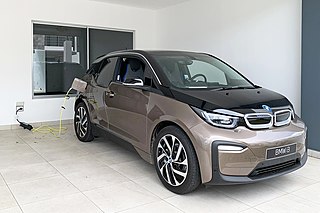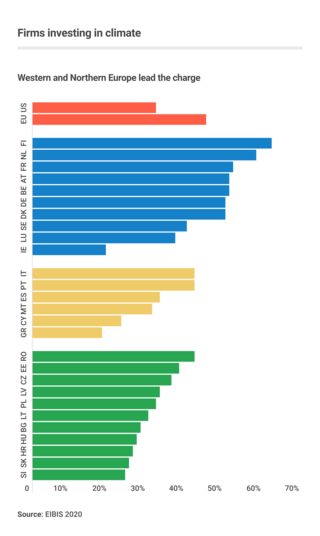
Distributed generation, also distributed energy, on-site generation (OSG), or district/decentralized energy, is electrical generation and storage performed by a variety of small, grid-connected or distribution system-connected devices referred to as distributed energy resources (DER).

An electric vehicle (EV) is a vehicle whose propulsion is powered fully or mostly by electricity. EVs include road and rail vehicles, electric boats and underwater vessels, electric aircraft and electric spacecraft.

The hydrogen economy is an umbrella term for the roles hydrogen can play alongside low-carbon electricity to reduce emissions of greenhouse gases. The aim is to reduce emissions where cheaper and more energy-efficient clean solutions are not available. In this context, hydrogen economy encompasses the production of hydrogen and the use of hydrogen in ways that contribute to phasing-out fossil fuels and limiting climate change.

Energy is sustainable if it "meets the needs of the present without compromising the ability of future generations to meet their own needs." Definitions of sustainable energy usually look at its effects on the environment, the economy, and society. These impacts range from greenhouse gas emissions and air pollution to energy poverty and toxic waste. Renewable energy sources such as wind, hydro, solar, and geothermal energy can cause environmental damage but are generally far more sustainable than fossil fuel sources.

A fuel cell vehicle (FCV) or fuel cell electric vehicle (FCEV) is an electric vehicle that uses a fuel cell, sometimes in combination with a small battery or supercapacitor, to power its onboard electric motor. Fuel cells in vehicles generate electricity generally using oxygen from the air and compressed hydrogen. Most fuel cell vehicles are classified as zero-emissions vehicles. As compared with internal combustion vehicles, hydrogen vehicles centralize pollutants at the site of the hydrogen production, where hydrogen is typically derived from reformed natural gas. Transporting and storing hydrogen may also create pollutants. Fuel cells have been used in various kinds of vehicles including forklifts, especially in indoor applications where their clean emissions are important to air quality, and in space applications. Fuel cells are being developed and tested in trucks, buses, boats, ships, motorcycles and bicycles, among other kinds of vehicles.

A green vehicle, clean vehicle, eco-friendly vehicle or environmentally friendly vehicle is a road motor vehicle that produces less harmful impacts to the environment than comparable conventional internal combustion engine vehicles running on gasoline or diesel, or one that uses certain alternative fuels. Presently, in some countries the term is used for any vehicle complying or surpassing the more stringent European emission standards, or California's zero-emissions vehicle standards, or the low-carbon fuel standards enacted in several countries.
The Ministry of the Environment, Conservation and Parks is an Ontario government ministry responsible for protecting and improving the quality of the environment in the Canadian province of Ontario, as well as coordinating Ontario's actions on climate change. This includes administration of government programs, such as Ontario's Drive Clean and Clean Water Act. The ministry headquarters are located inside the Ontario Government Buildings.

Business action on climate change is a topic which since 2000 includes a range of activities relating to climate change, and to influencing political decisions on climate change-related regulation, such as the Kyoto Protocol. Major multinationals have played and to some extent continue to play a significant role in the politics of climate change, especially in the United States, through lobbying of government and funding of climate change deniers. Business also plays a key role in the mitigation of climate change, through decisions to invest in researching and implementing new energy technologies and energy efficiency measures.

The Chevrolet Volt is a plug-in hybrid and extended-range electric vehicle car that was manufactured by General Motors, and also marketed in rebadged variants as the Holden Volt in Australia and New Zealand and the Buick Velite 5 in China, and with a different fascia as the Vauxhall Ampera in the United Kingdom and as the Opel Ampera in the remainder of Europe. Volt production ended in February 2019.

The United States produced 5.2 billion metric tons of carbon dioxide equivalent greenhouse gas (GHG) emissions in 2020, the second largest in the world after greenhouse gas emissions by China and among the countries with the highest greenhouse gas emissions per person. In 2019 China is estimated to have emitted 27% of world GHG, followed by the United States with 11%, then India with 6.6%. In total the United States has emitted a quarter of world GHG, more than any other country. Annual emissions are over 15 tons per person and, amongst the top eight emitters, is the highest country by greenhouse gas emissions per person.

Efficient energy use, or energy efficiency, is the process of reducing the amount of energy required to provide products and services. There are many technologies and methods available that are more energy efficient than conventional systems. For example, insulating a building allows it to use less heating and cooling energy while still maintaining a comfortable temperature. Another method is to remove energy subsidies that promote high energy consumption and inefficient energy use. Improved energy efficiency in buildings, industrial processes and transportation could reduce the world's energy needs in 2050 by one third.

A car, or an automobile, is a motor vehicle with wheels. Most definitions of cars state that they run primarily on roads, seat one to eight people, have four wheels, and mainly transport people over cargo. There are around one billion cars in use worldwide. The car is considered an essential part of the developed economy.
The climate change policy of the United States has major impacts on global climate change and global climate change mitigation. This is because the United States is the second largest emitter of greenhouse gasses in the world after China, and is among the countries with the highest greenhouse gas emissions per person in the world. Cumulatively, the United States has emitted over a trillion metric tons of greenhouse gases, more than any country in the world.

The BMW ActiveE was a demonstration electric car based on the BMW 1 Series small family cars. It was the second vehicle after the Mini E to be developed under BMW Group’s Project i. The electric drive system was the latest addition to BMW’s EfficientDynamics programme. The US Environmental Protection Agency official range is 151 kilometres (94 mi), with an energy consumption of 33 kW·h/100 miles, and the agency rated the ActiveE's combined fuel economy at 2.3L/100 km.

Proposition 23 was a California ballot proposition that was on the November 2, 2010 California statewide ballot. It was defeated by California voters during the statewide election by a 23% margin. If passed, it would have suspended AB 32, a law enacted in 2006, legally referred to its long name, the Global Warming Solutions Act of 2006. Sponsors of the initiative referred to their measure as the California Jobs Initiative while opponents called it the Dirty Energy Prop.

Automotive air conditioning systems use air conditioning to cool the air in a vehicle.

Autonomous Fusion is an American autonomous vehicle company headquartered in Atlanta, Georgia. The company develops vehicle technologies including software, systems, tools for autonomous vehicles and self-driving cars, artificial intelligence/machine learning, and IoT connected devices for the home, business and roadway. The company is led by CEO Mike McQuary.
This article documents events, research findings, scientific and technological advances, and human actions to measure, predict, mitigate, and adapt to the effects of global warming and climate change—during the year 2022.

The Inflation Reduction Act of 2022 (IRA) is a United States federal law which aims to reduce the federal government budget deficit, lower prescription drug prices, and invest in domestic energy production while promoting clean energy. It was passed by the 117th United States Congress and signed into law by President Joe Biden on August 16, 2022.















